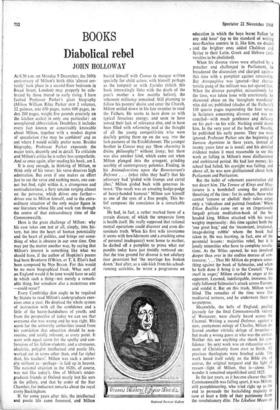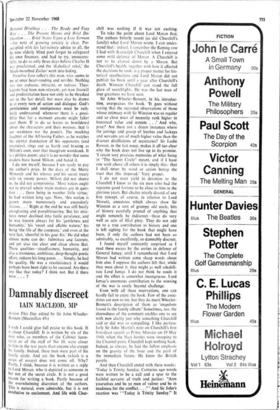Diabolical rebel BOOKS
JOHN HOLLOWAY
At 6.30 a.m. on Monday 9 December, the 360th anniversary of Milton's birth (this 'almost cer- tainly' took place in a second-floor bedroom in Bread Street, London) may properly be cele- brated by those inured to early rising. I have faulted Professor Parker's giant biography (Milton William Riley Parker OUP 2 volumes,
12 guineas, text 650 pages, notes 600 pages, in- dex 260 pages, weight five pounds precisely on the kitchen scales) in only one particular: an unexplained abbreviation. Doubtless it includes every fact known or conceivably knowable
about Milton, t'ogether with a modest degree of speculation ('we may be confident' and so on) where I would mildly prefer none. Besides biography, Professor Parker expounds the major texts, decently and in detail. To criticism
and Milton's critics he is rather less sympathetic.
And so once again, after reading his book, am I. It is easy enough, in thinking of Milton, to think only of his verse: his verse deserves high admiration. But even if one makes an effort just to see the verse and nothing more, one can- not but find, right within it, a strangeness and contradictoriness, a fiery tension verging almost
on the perverse, which drives one further—
drives one to Milton himself, and to the extra- ordinary situation of the only major figure in
our literature whose life and work run through the centre of that extraordinary time of the Commonwealth.
Here is the great challenge of Milton : why his case takes one not at all, simply, into his- tory, but into the heart of human potentiality
and the heart of politics, and brings out some- thing of what is obscure in our own time. One
may put the matter another way, by saying that Milton's interest is something like what we should have, if the author of Hopkins's poems had been Bronterre O'Brien, or T. S. Eliot's had been composed by Nye Bevan. For this would be no mere biographical freak. What sort of
an England would it be (one would have to ask) in which such a thing—not merely a remark- able thing, but somehow also a monstrous one —could occur?
Every Cambridge don ought to be required by Statute to read Milton's undergraduate exer- cises once a year. He despised the whole system of instruction with all the confidence and a little of the heavy-handedness of youth; and from the perspective of today we can see that everyone else was wrong and he was right. His scorn for the university authorities issued from his conviction that education should be non- routine, and totally relevant, at every point. It went with equal scorn for the apathy and con- formism of his fellow-students, and a strenuous, idealistic, polyglot intellectual and poetic life, worked out in terms other than, and far richer than, his teachers'. Milton was such a univer- sity militant as—perhaps—is laid up in heaven. The national situation in the 1620s, of course, was not like today's. One of Milton's under- graduate friends at Oxford nearly lost his ears in the pillory, and that by order of the Star Chamber, for indiscreet remarks about the royal crony Buckingham.
If, for some years after this, the intellectual and poetic life came foremost; and Milton busied himself with Collins (a masque written specially for child actors, with himself perhaps as the tempter) or with Lycidas (which this book interestingly links with the death of the poet's mother a few months before), the vehement militancy remained. Still planning to follow his parents' desire and enter the Church, Milton settled down in his late twenties to read the Fathers. He seems to have done so with typical ferocious energy; and soon to have sensed their lack of relevance also, and to have been filled with reforming zeal at the thought of all the young competitivists who were docilely getting them up on the way into the lush pastures of the Establishment. The younger brother in Cornus may say 'How charming is divine philosophy!' without irony; but there was also another kind, which came out when Milton plunged into the arrogant, grinding acerbity of contemporary polemics. Finding, in his Animadversions upon the Remonstrant's Defence . . . (what titles they had!) that his adversary had 'girded with frumps and curtal jibes,' Milton girded back with generous in- terest. 'The result was an amazing hodge-podge of heavy-handed humour.' Milton saw himself as one of the eyes of a free people: This be- lief composes the conscience in a remarkable way.
He had, in fact, a rather marked form of a certain disease, of which the temperate form is health itself. He really supposed that rational mental operations could discover and even dis- seminate truth. When his first wife (overcome it seems with bewilderment and a crushing sense of personal inadequacy) went home to mother, he dashed off a pamphlet to prove what our pundits today have just timidly ventured on: that the true ground for divorce is not adultery (nor desertion) but 'the marriage has broken down? Just after, as a side-kick from his school- running activities, he wrote a programme on
National Portrait Gallery
education in which the boys learnt Italian 'at any odd hour' (up to the standard of writing near-flawless sonnets in it, like him, no doubt) . and the brighter ones added Chaldean and Syriac to their Latin, Greek and Hebrew (uni- versities to be abolished).
When his divorce views were attacked by a preacher and challenged in Parliament, he broadened the discussion and charged again— this time with a pamphlet against censorship. But Areopagitica was ignored—that charac-
teristic pang of the militant was not spared him.
When the divorce pamphlet, miraculously for the time, was taken issue with courteously, he showered abuse on the incogitant woodcock' who did so; published (shades of the Fathers!) 110 quarto pages expounding the four verses
in Scripture concerning divorce; and was re- conciled—with much gentleness and delicacy on his part—to his wife. Nothing could daunt him. In the very year of the battle of Naseby, he published his early poems. They too were ignored. Professor Parker sets the beginning of Samson Agonistes in these years, instead of twenty years later as is usual; and his detailed evidence makes it most reasonable to see this work as falling in Milton's most disillusioned and embittered period. He had lost money, his school had failed, his eyesight was failing, and above all, he was now disillusioned about both Parliament and Puritanism.
But the habit of vehement asseveration did not desert him. The Tenure of Kings and Mag- istrates is a bombshell among the political theorising of the time: for its author, those who cannot 'remove or abolish' their rulers enjoy only a 'ridiculous and painted freedom.' When Eikon Basilike came out as an (ingeniously forged) private meditation-book of the be- headed king, Milton attacked with his usual weighty impetuosity: this time against both the 'one great hog,' and the 'inconstant, irrational, image-doting rabble' whom the book had taken in. He was learning, in fact, one of the perennial lessons : majorities rebel, but it is lonely minorities who have to complete revolu- tions. As the 'fifties opened, he was involved deeper than ever in the endless morass of con- troversy. That Mr Milton do prepare some- thing against tie book of Salmasius, and when he hath done it bring it to the Council.' You snarl in anger,' Milton snarled in anger at his opponent. Learned, indefatigable, immense, his reply followed Salmasius's attack across Europe, and outdid it. But on this trash, Milton went blind. The remedies of the time were like mediaeval tortures, and he underwent them to no purpose.
Meanwhile, the bells of England, pealing joyously for the final Commonwealth victory of Worcester, were clearly heard across the Channel. Writing a second Defence, against a new, anonymous eulogy of Charles, Milton de- livered another vitriolic deluge of invective— but made a wrong guess at who was the author. Neither this nor anything else shook his con- fidence: his next work was an exhaustive state- ment of Christianity from start to finish. All previous theologians were brushed aside. The work based itself solely on the Bible (in, of course, the original tongues) and the light of reason—light of Milton, that is—alone. No wonder it remained unpublished until 1825.
In the last years, as it became clearer that the Commonwealth was falling apart, it was Milton, still pamphleteering, who tried right up to the end to persuade the backsliding majority to save at least a little of their patrimony from the revolutionary elite. The Likeliest Means to Remove Hirelings . . . The Ready and Easy Way . . . The Present Means and Brief De- lineation . . . Brief Notes Upon a Late Sermon —the note of growing anxiety is clear. Pre- occupied with his last-minute advice to all, the by now elderly blind poet forgot to safeguard his own finances; and had to try, unsuccess- fully, to do so only three days before Charles H was proclaimed. and the 'diabolical rebel,' the 'black-mouthed Zoilus' went into hiding.
Paradise Lost reflects this man, who seems to me at once heart-rending and terrible. Nothing was too arduous, intricate, or tedious. Theo- logians had been non-relevant, yet now freewill and predestination have not only to be thrashed out to the last detail, but must also be drawn in at every turn of action and dialogue. God's omniscience and omnipotence must be ruth- lessly underscored whenever there is a possi- bility that for a moment anyone might falter over them. If to do so leaves us bewildered about the characters and their motives, that is our weakness not the poem's. The mocking laughter of the All-loving Father, as he watches the eternal damnation of his opponents (and creatures), rings out as harsh and bracing as Milton's own, over that incogitant woodcock. It is a pitiless poem: and it is no wonder that some readers have hated Milton. and hated it.
I do not myself, because I am ready to pay the author's price. In the days of the Merry Monarch and his whores and his secret treaty with an enemy power, Milton did not shame us, he did not compromise. 'Most voices ought not to prevail where main matters are in ques- tion . . . there being in number little virtue,' he had written long ago. Now, 'this nation is grown more numerously and excessively vicious . ..' Right at the end he was still busily excogitating and pamphleteering. But his stric- tures never declined into futile petulance, and he was known always for his 'gentleness and humanity,' his 'sweet and affable nature,' his being 'the life of the company.' and even at the very last, 'cheerful in his gout fits.' He did what almost none can do: fulminate and lacerate, and yet also rise clear and clean above that. These qualities—steadfastness, humanity, and also a strenuous, ambitious, deep-thought poetic effort, redeem his long poem.... Simply, he had the quality. He was a revolutionary it would perhaps have been right to let succeed. Are there any like that today? I think not. But if there were . . . ?



































 Previous page
Previous page